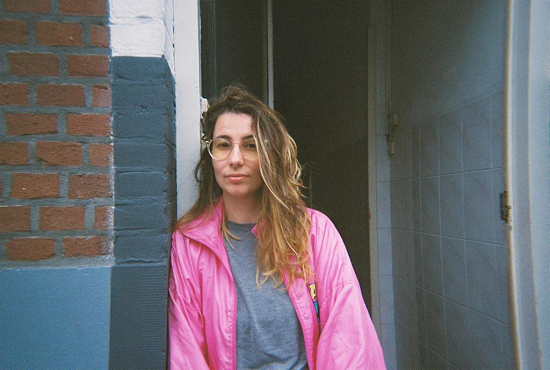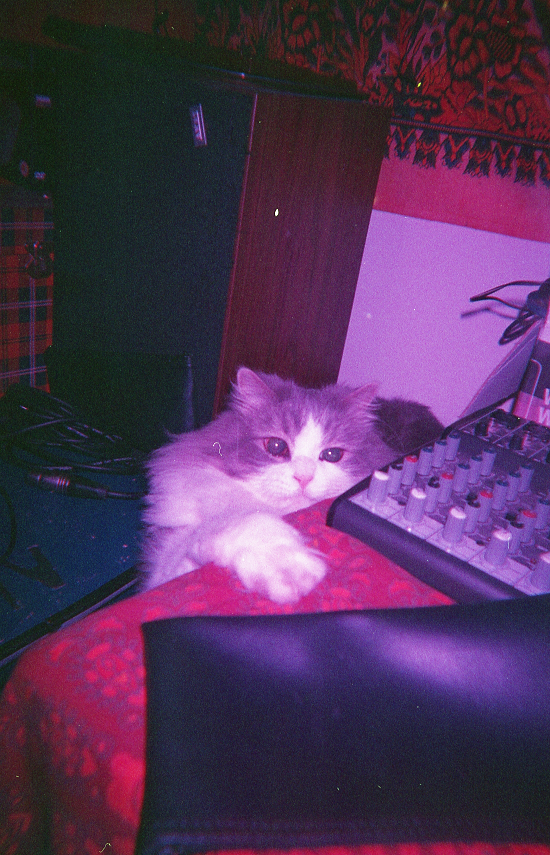In the days before the pandemic, musician Alicia Breton Ferrer was fronting two bands. Longstanding noise outfit The Sweet Release of Death had not long finished touring to support their third album The Blissful Joy Of Living. Following particularly gruelling recording sessions, after the shows “we were alive again,” the musician says on a video call from her home in Rotterdam. Her other group, the experimental rock project Neighbours Burning Neighbours, were just picking up steam after their punchy first two singles ‘Grace’ and ‘Softly’, and were hoping to enter the studio for an album after a run of summer gigs. Then, of course, “everything fell apart. We’re all sort of on standby because we all really live for live music.”
Breton Ferrer’s day job at that time was in a local hostel, and she was let go during The Netherlands’ first wave of coronavirus cases. Left at a loose end in the lockdown void, she started to mess around with some old Casio synthesisers that had been laying around since she was a teenager. “I just played around like it was arts and crafts then, all of a sudden, songs came out and it got out of hand.” Where with The Sweet Release Of Death and Neighbours Burning Neighbours songwriting was methodical and collaborative, this time there was a playfulness to her process. “When you’re in a band you have to have conversations with everyone, everyone has to be on the same page. Now I could just do it all and not give a fuck because I didn’t have to discuss it with anyone but myself.”
“It felt almost like improv,” she continues. “I would look for a nice sound, not knowing what I was going to do with it, then put down a basic rhythm with this sound, then go looking for another interesting sound and keep improvising on top of that. It was all done in a haze, where I would get lost and see what comes out of it.” A year later, she has released debut solo album Headache Sorbet, a record ostensibly lo-fi and home-recorded, but one of considerable textural depth. From explorations of banality to its intense emotional wrenches, it’s as accurate a reflection of those mad, moodswinging first days of the pandemic as you’ll hear. There are meandering schprechgesang explorations of the ordinary: ‘I’m sorry for the dead insect’, and there are mad sonic leaps; a sudden injection of manic drum ‘n’ bass here (‘No Suicide In The Kitchen’), a whacked-out psychedelicised flamenco rhythm there (‘Having Fun’).
As the project progressed, Breton Ferrer added more and more layers to Headache Sorbet, but never departs from its context. It’s “very literally” a lockdown project, she says. “Basically, it was the only thing that kept me alive psychologically.” A song like ‘Everything Is Going To Be Alright’, on which the musician repeats those words over a simple guitar line that builds and builds in desperation, is charged with the intense levels of resolve we’ve all found in the face of worldwide calamity. ‘Iggy’ is essentially a warm and intimate dialogue between Breton Ferrer and her cat. On some songs you can still hear the clack of a plastic key on a Casio keyboard.
The first and third songs on the record, the elegantly spiky ‘Nosebleed’ and the whacked-out no-wave soundscape ‘Eyeball’, were written in the very first week of lockdown and sent out to friends who displayed enthusiasm, “but it didn’t get really serious ‘til after two months, where I thought ‘OK, this can be something that’s not only for fun, maybe it can see daylight as well.” For all her previous groups, this is the very first time Breton Ferrer has completed a solo project. “Because I was scared before,” she explains, “and I could always be protected by all these big people surrounding me in bands.” That said, as her career has progressed she’s been gradually making her way to centre stage, starting as a drummer, then becoming bassist and vocalist in The Sweet Release Of Death, and guitarist and frontperson in Neighbours Burning Neighbours. “I got cosy in the back, but then it started itching,” she says of drumming. “Like, ‘I actually want to write the melodies, I want to move and dance’.”
Reduced expectations for the results and an enforced lack of collaborators meant that Breton Ferrer could make that final step forwards to full auteur when it came to her lockdown experiments. The project also became something of a mental crutch. Take ‘Red Alert’, the record’s longest and arguably bleakest song. “That was a song I started on a Friday morning. I know it was Friday because at the end of the day, when I had the instruments done, I got this email from the place that I worked, essentially saying ‘We so appreciate your effort working for us, and we checked if we could help you through the pandemic with funding, but yeah. We’re not going to do that.’ Basically, right before the weekend they said, ‘fuck you, you don’t get any money.’ I couldn’t sleep I was so angry, so I just thought ‘OK, I’m going to finish the whole song’ and I recorded vocals. [The album] was the only thing I could escape to for hours and hours on end, even in the middle of the night.”

Lockdown also gave Breton Ferrer the time and space to explore her influences in greater depth. On the album’s most striking track ‘Having Fun’, for example, she explores her love of flamenco music, weaving her own take on the style’s hypnotic Palmas clapping rhythms into the track. “When I was a kid I admired these ladies with their dresses, the clapping and the dancing, but my mum was always trying to dress me up as a boy,” she says. “I used [the new album] as research, to try out these sounds, just to keep me going in boring pandemic life.”
Spanish music was a fixture of Breton Ferrer’s upbringing. Her father is the folk musician Carlos Breton Ferrer, a refugee from the Spanish Civil War whose work is rooted in traditional styles from across Spain and Latin America. “We would always have musicians over,” she remembers of her childhood. “Staying over for a few weeks because they had travelled through the Netherlands or were playing with my dad. They would play hours and hours of these folklore songs. As a teen I hated it because I’d so much rather listen to stuff like Nirvana, but now I realise just how much it influenced me. A few years ago, I saw my father playing, and there was this guy in the band playing the charango,” a Bolivian guitar-like instrument, traditionally made from the shell of an armadillo. “I listened to his playing and it sounded so dissonant. I suddenly thought ‘I understand now why I only listen to dissonant punk and post-rock songs. They were doing that in their own way.’ I’m not the teen that wants nothing in common with her dad,” the musician, now 32, continues. “I’m starting to realise how much of a rich influence it really is.”

Breton Ferrer’s cat and collaborator, Iggy
Carlos Breton Ferrer had lockdown experiments of his own, the elder musician blowing across a flute to create jarring overtones, “to see what kinds of sounds he could get out of it.” His wife sent the recordings to their daughter. “She said she was going crazy, because my dad was practising this overtone thing with all the doors open for weeks, for all the neighbours to hear as well, and said ‘of course you would probably like it.’ I thought ‘Oh yeah, it’s perfect!’” As luck would have it, it fitted perfectly with a song she was working on, the lurching and twisted ‘Control’, and so it became another layer of Headache Sorbet’s strange tapestry.
As the pandemic tentatively begins to abate in Europe for what appears to be the final time, Breton Ferrer has emerged with a unique document of it, one that encapsulates both her unique experience of the last year, and the period’s universal realities. It’s a record equal parts intimate and extreme. Just as it remains to be seen what a post-pandemic world will look and feel like, the future for Breton Ferrer as a solo musician is tentative. She hopes to translate it to a live setting, “it’s a dream to do it, but I can also imagine it being best as a home recording project.” Whatever happens next, bar another pandemic, it’s impossible to imagine another album quite like this one.
Headache Sorbet is out now via Glove Compartment



